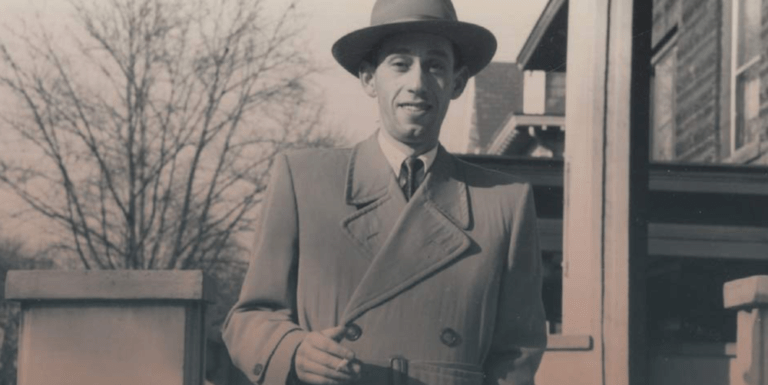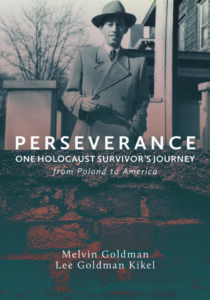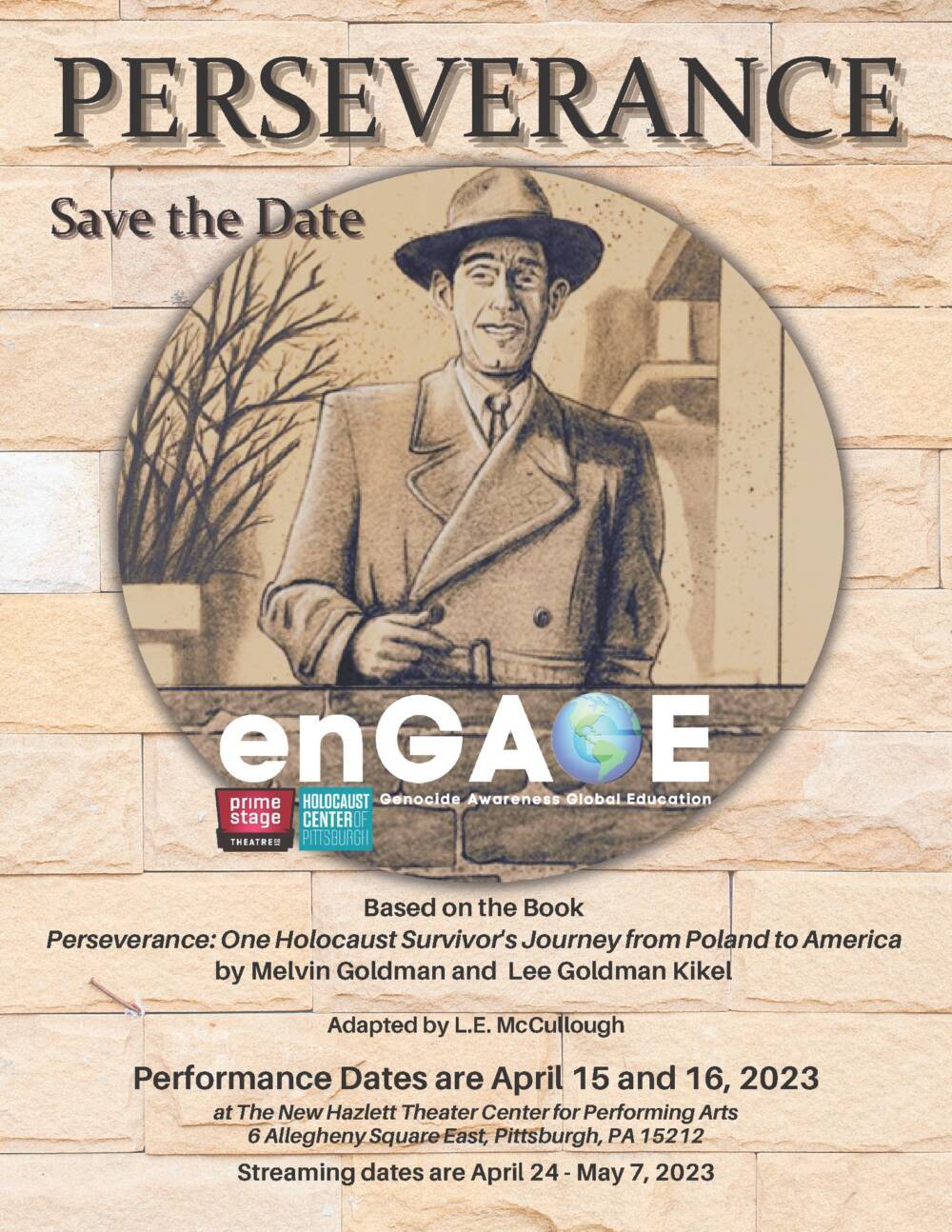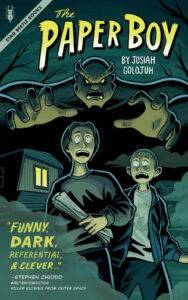From the Publisher: “Melvin Goldman seemed to be a typical successful American, living with his family in Squirrel Hill, a multicultural Pittsburgh neighborhood with a large Jewish population. There, he turned his craftsmanship as a jewelry designer into a profitable business, and maintained a rosy outlook on life and a generous view of his fellow man. It may seem like a common story, but it is far from it. In the decade before his arrival in the United States in 1950, Mieczyslaw Goldman saw his home destroyed, his family torn apart, his health ruined, and nearly everyone he had ever known murdered in the death camps of the Third Reich. His survival of the years in the ghetto and Auschwitz, his long and slow recovery, and his attainment of a somewhat normal life are miraculous.
Perseverance witnesses the life and legacy of Melvin Goldman. Part One of the book, previously excerpted on Littsburgh, is in Goldman’s own words, assembled from the bits and pieces of his life he recorded in free moments in his Squirrel Hill jewelry store. In Part Two, Lee Goldman Kikel, Melvin’s daughter, recalls the happy life of a Squirrel Hill Jewish family, and pays tribute to a father who lived through unimaginable atrocities, but maintained his faith in God and humanity.”
Start Reading About the Author: “Lee Kikel is a retired mental health rehabilitation counselor, professional speaker and the author of the book Perseverance: One Holocaust Survivor’s Journey from Poland to America. A graduate from the University of Pittsburgh with concentrations in psychology and education, her passions include teaching, traveling, gardening, and presenting her father’s story to the world. To connect with Lee and stay updated on her upcoming events, visit www.leekikel.com.”
More info “A tremendously stirring story . . . [told]through thick description of one Jewish man’s life in Poland, and later, in America following the Second World War. By situating this book in the details of the ‘local,’ the co-authors offer a personalized story of how the Holocaust unfolded in one man’s life and how that same man emerged with an outlook that was nothing less than amazing.” —Rabbi Aaron Benjamin Bisno, Rodef Shalom Congregation, Pittsburgh
“The premise of local history is that every story is worth telling, provided you have enough documentation to support it. Melvin Goldman did the hard work of creating and preserving that documentation, and his daughter, Lee, did the hard work of bringing it together into a narrative. The result is a local, individualized look at a communal experience. The section about Squirrel Hill is particularly valuable, as that story is only just beginning to be told in detail.” —Eric S. Lidji, Director, Rauh Jewish History Program & Archives, Senator John Heinz History Center, Pittsburgh, in association with the Smithsonian Institution
“Perseverance is the testimony of a Holocaust survivor and his daughter to one man’s journey and spirit. Melvin Goldman’s experience was in some ways typical of the torture and starvation by the Nazis, but it is also deeply particular and gripping. It is an inspiring book, a record of a life well lived after unbearable suffering and loss.” —Meredith Sue Willis, author, Out of the Mountains, Their Houses, and Oradell at Sea, among other books
When you found your father’s tapes and heard the retelling of his experiences during the Holocaust, did you know that he had been recording them?
My father, Melvin Goldman, dictated the tapes in the late 1970s, and I knew about them, but I was in college and never took the time to listen to them. It was in 2015, when my family was taking a trip to Europe, that my son Jason suggested that I listen to the tapes before we visited the place where my father grew up. My dad had been gone for almost 20 years when I started listening to the first tape. I hadn’t heard his voice for so long. It was very emotional, and then as I was listening to his second tape, I heard him say I would like my story put into a book, and that’s how I got on the path to writing and honoring his wishes.
Did you ever hear your father talk about his childhood before the Third Reich invaded Poland or his experiences during the Holocaust?
He didn’t talk much about it until I was in college. My grandfather owned a sheet metal factory in Poland, and he did ornamental metalwork. They would visit the countryside in the summertime. There was anti-Semitism, but they just sort of accepted it. My father experienced it in school, and he experienced it playing soccer with other kids. He recalled that at the time, he heard rumors that the Nazis would invade Poland, and in 1939, the city that my father lived in, Łódź, was made into a ghetto.
In the book, your grandfather tells his children that they must survive so that their family name stays alive. It seems that Melvin’s story of enduring the ghetto, living through Nazi concentration camps, and being a displaced person after the war all revolved around those words that his father had said to him. Why do you think those words resonated so much with him?
He admired his father. My grandfather said to Melvin that someone must live; even if you have to eat dirt from the earth, the family name must live on. My father said in his tapes that those words stayed with him; even at his worst, when he felt that he wanted to die, he said he tried to have hope and hang on.

Melvin Goldman was a survivor of the Auschwitz concentration camp. As you listened to him recount his experiences there, how did you feel?
I don’t think I realized the magnitude of it until I listened to the tapes and saw the testimony he sent to the US Holocaust Memorial Museum. To listen to his retelling of the torture he endured—the degradation, the humiliation, everything—was extremely difficult. Sometimes, I had to displace myself in order to get through the material while listening to my own father’s voice on his tapes. Yet his words drove me to complete the task.
When he and his family left the ghetto, they left in a cattle car. Once they arrived at Auschwitz, my father and his brother went one way, and the rest of the family went the other way. That was the last time my father ever saw his family again. What got me through listening to the tapes was what an incredible person he was and his willingness to persevere.
Somehow your father survived and decided that he wanted to come to America and leave Poland. Why did he move to the United States?
Because my father’s family was in the metalworking business, and after five years of rehabilitation in Germany, he chose to come to Pittsburgh because its manufacturing industry was similar to the city he grew up in.
I understand that your book has been adapted into a play. Can you tell me about that?
I am so thrilled that Perseverance is coming to life on stage! The Holocaust Center of Pittsburgh partnered with Prime Stage Theatre to share Melvin’s story and legacy with the Pittsburgh community and global audiences. Visitors can see the play, adapted by Pittsburgh-based playwright and musician L.E. McCullough, performed April 15-16 at the New Hazlett Theater on Pittsburgh’s North Side. The play will also be available for global streaming next April and May.
Why is this story so important, and what do you hope people take away from it?
My father had so much foresight and wisdom to record his story. I think he realized we have to preserve these stories; they need to be told, they need to be shared, and we need to continue to educate the world.
This is a story of survival and beating the odds but also of hope, tenacity, and perseverance. My father struggled and won. Once he began to recuperate, he promised himself he would learn as much as he could, work hard, and become the best person he could be. He found his place in life and left a lasting influence on those who knew him. May his influence be passed on to others through this book. My hope is to share this story with as many people as I can in as many ways as possible, as was my father’s wish.
Start reading Perseverance: One Holocaust Survivor’s Journey from Poland to America…



























